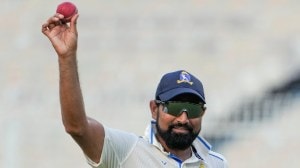All past greats have suffered rejection
NOVEMBER 6: Mohammed Azharuddin and millions of his fans may be passing through a similar sentiment after the selectors did not deem it f...

NOVEMBER 6: Mohammed Azharuddin and millions of his fans may be passing through a similar sentiment after the selectors did not deem it fit to include him in the Indian side to tour Australia later this month. His defenders have floated a number of theories conspiratorial or otherwise which has prevented the wristy stylist from taking, what they feel, his rightful place in the side.
If the world is viewed from their point of view, then there is no justice here: the deserved are condemned, the unworthy get the rewards. True and false, depending on which side of the fence you are sitting.
During the World Cup, one thing was certain: Only a victory could have led to Azhar retaining the captaincy. Even at that time there was sufficient rumbling that he was the wrong man to be leading India. Wrong man not only because he was an unimaginative leader of men but also because his form was so fickle.
Howsoever preposterous this suggestion may have been, there were many who believed that Azharuddin8217;s best waspast him and it was time for him to call it a day.
On that tense and eventful day at Manchester, when India took on Pakistan in the Super League, Azharuddin stuck around to make a half century and lead his team8217;s remarkable rally. Till he played that innings, Azharuddin had nothing substantial to show for his labours at the crease. Labour, perhaps, is the right word to use for his efforts in the World Cup, as the man whose steely wrists have painted many a magical canvas on the cricket field with his bat, struggled to regain his touch. As time passes by and your reflexes slow down, the tag of greatness can become a burden on the field.
The half century was a valuable effort, but for many of Azharuddin8217;s fans the spark which they had expected him to produce was missing. The general refrain was it was time for the man to quit. Nobody wanted to remember Azharuddin as a batsman who was finding it difficult to make runs, least of all his fans, whose number is legion in England.
The point here is thatAzharuddin may still be good for the odd fifty, but that is a score which far lesser mortals are capable of making.
Somebody like Azharuddin, by staying in the team, is bound to block and delay a talented youngster8217;s entry into the field. All the past greats have had to pass through these pangs of rejection. And most of them had to be ticked off. They never quit.
By all means find the reasons for why we treat greatness8217; once past its prime with disdain and why wrong8217; men take the right8217; places. But, does that make a case for Azharuddin8217;s return?
- 01
- 02
- 03
- 04
- 05






























